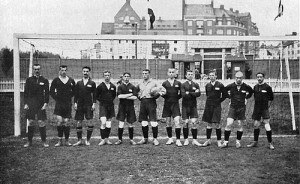On the 18th July 2013 the Court of Justice of the European Union (CJEU) issued its decision on an appeal brought by FIFA and UEFA (the world and European football organisations) against the UK and Belgium. This was the final chapter in a saga dating back to 2007. The case concerned the restriction on the ability of FIFA and UEFA to sell World Cup and the European Championship matches on an exclusive basis to pay-per-view channels. The background to the case concerns the Audiovisual Media Services Directive (AVMS) (previously the Television without Frontiers Directive). The Directive provides that Member States may draw up a list of events with “major importance for society” (Article 14(1)). These are events that are deemed to be of national significance. The events listed must be accessible on public free-to-view television.
The UK drew up a list in 1998 in which it designated that all football games within the World Cup and European Championship matches were of the requisite national importance to make the list. As such these games must be made available on free-to-view television. The basis of the challenge stems from the fact that a Member State is required to submit its list to the Commission for approval. With regard to the UK, the council issued a decision confirming that the UK’s list was valid and enforceable in 2007. In 2008 both FIFA and UEFA challenged this decision. The challenge subsequently spawned a European General Court judgment, a number of appeals, an Advocate General’s opinion and now a decision of the CJEU.
The Points of Appeal
The CJEU dismissed the appeals of FIFA and UEFA holding that the measures currently in place are lawful. The appeals raised three main concerns:
- Firstly, it was inappropriate that every single match of the tournaments had been designated on the list.
Essentially it was argued that only the popular and most viewed matches should make the list. In response, the court emphasised that the definition of “event of major importance” may differ between Member States (para. 34). A particular sport may be more important or popular from one country to another. For instance, handball is a major professional sport in France but has much less significance in the UK. Turning back to football, the court noted that in theory any game of the World Cup may have significance as it could impact on the order of which teams would have to be played next. Therefore it is not possible to state that by virtue of a game being in a group stage it cannot be of national importance. Moreover at recital 18 of the Directive it explicitly states that the World Cup and the European Championship are the types of events that should be free to view. Thus, it was clearly within the thinking of the European Parliament when the legislation was passed.
Conversely, on the basis that events of significance do change from country to country the World Cup and European Championships cannot be per se events of major importance for every country in the EU. Therefore, in practical terms, a Member State is not freed from its obligation to communicate to the Commission the reasons justifying the designation (para. 41). A future Member State seeking to designate the World Cup or European Championships on their list of national importance is still required to explain why these events have been designated in the specific circumstances. Ultimately the Commission must verify the designation before it can be confirmed.
- Secondly, The ability of a member state to list an event obstructs their freedom to provide services and constitutes an infringement of the Treaty provisions on competition law.
There were various connected arguments that the listing system presented obstacles to the freedom to provide services, the freedom of establishment, the freedom of competition and the right to property. The court approached these various issues along the same lines in a relatively straightforward manner. At para. 22 it was noted, “it is undeniable that a valid designation of an event as being of major importance leads to inevitable obstacles.” Here the court highlights that the fact that the legislation went through in such a form exemplifies that the legislature has considered the potential impact on freedom to provide services etc. The legislature has been aware of these factors and regards them as justified.
At para. 126 the court notes that the system of listing was justified by the objective of protecting the right to information and ensuring wide access by the public to television coverage of events of major importance. Essentially the public’s right to access to events of major importance to that society and freedom of information outweighed those rights available to FIFA and UEFA. The court held that FIFA did not provide evidence that the measures with regard to listing were so excessive that the transcended the boundaries of proportionality (para. 127). The same mantra was repeated at para. 131, there was simply not enough evidence to show that the impact on freedom of competition by the listing of all matches of the entire tournament were excessive. The European Parliament did not overlook these issues. In fact they considered the impact carefully resolving that the measures were justified.
- Thirdly, European Commission did not undertake an adequate review of the lists of major importance submitted by the UK and Belgium before validating them.
Again the court was quick to dismiss this argument. It is vital to bear in mind that in pursuance of the Directive the Member States were purposely given a broad discretion to define and designate which specific events should make their national lists. At para. 123 the court states having regard to Article 14(1) of the AVMS Directive ‘the Commission is required to carry out a limited review… there is no obligation to carry out a ‘thorough’ verification or ‘detailed assessment’ of the competition law issues.’ The process of verification that the Commission is required to do is relatively simple. They must carefully and impartially examine whether the reasons used to justify the designation of the event on the list support the conclusions reached (para. 21). What the Commission cannot do is attempt to harmonise member states lists or substitute its own opinion. It is up to the national authorities to compile the list following the guidance on transparency under Article 14. Therefore, objections to the content of the list should be addressed to the relevant national authorities rather than the Commission.
The Impact of the Decision
The decision in the end was pretty straightforward with the CJEU simply confirming what was already in operation. The court did highlight that Member States will still be obliged to justify the designations of such events. However, there is not going to be any major U-turn on how these games are sold. From the perspective of the average football fan in the UK this is probably great news. At the moment you are not going to be forced to have to pay to watch these matches. I say ‘at the moment’ due to the fact that the UK’s current list of events of major importance, drawn up in 1998, is set to be reviewed imminently. The UK could always remove the designation of the World Cup and European Championship from the list. However, taking into account the time and expense invested by the UK in this case one suspects the designation will not be changing anytime soon.
This decision may have been relatively straightforward but the worlds of sport and law often interact at a delicate nexus. This is due in part to the fact that whilst essentially an economic activity, sport has an over-arching socio-cultural impact distinguishing it from your average business. Sport offers substantial benefits in the way of education, integration and opportunity not least for the youth of today and tomorrow. Thus, the organisers of sport are tasked with ensuring that their sport fulfills its socio-cultural potential to the full. In order to attempt to do this organisers often seek full autonomy on how their sport operates. Overall, these sports organisation can be extremely powerful and form a significant lobbyist force to parliaments.
This means lawmakers are tasked with ensuring that sport operates within the bounds of commercial law whilst also allowing organisers to fulfill the needs of the various wide-ranging stakeholders the best they can. As such it is always interesting to take stock of what the European courts decide when presented with a conflict between sport and law. The decision may appear relatively simple but arguably it substantially impacts on both FIFA and UEFA. The court overlooked the wider arguments that increased funding from selling TV rights would increase investment further down the football chain to the grassroots. Lack of funding may have a direct impact on the ability of these organisations to deliver programmes providing education, integration and opportunity. Further, the decision dampens the influence with which these organisations may have attempted to lobby the UK government on the list. The decision weighs strongly in favour of the UK’s actions. Only time will tell what the new list will designate but for the moment football fans around the UK will have free access to the World Cup and European Championships.
Image courtesy of paukrus on Flickr



